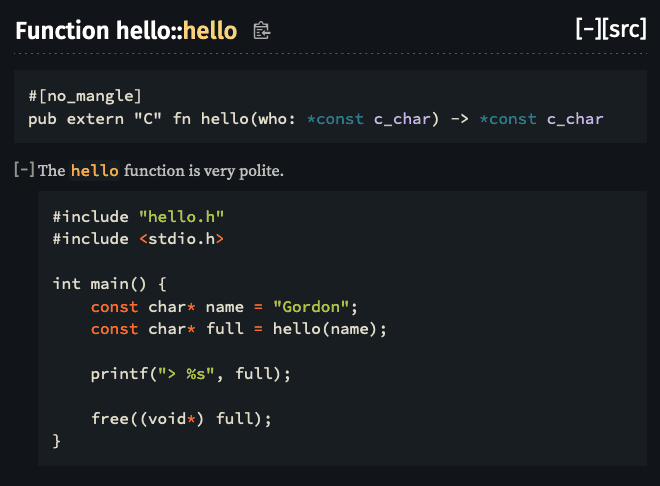

July 6, 2021
Novel way to Develop, Test and Document C libraries from Rust
Wasmer has designed a unique solution to test and document its own C API.
Syrus Akbary
Founder & CEO
Wasmer server-side WebAssembly runtime comes in multiple flavors. Written in Rust, it is embedded in different languages, such as C, Python, Go, Ruby, PHP, Java, and many more (discover all the integrations).
As many of our embeddings, the C embedding is implemented in Rust itself. Rust is perfectly capable of exposing a C compatible ABI (learn more by reading The Rustnomicon Book, the Foreign Function Interface Chapter). Moreover, Rust comes with a first-class tooling for testing and documenting projects. We wanted to leverage those tools to:
- Test with
cargo test --liband withcargo test --doc, - Document with
cargo doc.
Why? Because they are simple, they work everywhere, and every Rust programmer knows them. They are part of the foundation of the Rust ecosystem.
Testing: let's write C directly in Rust
If you are a Rust developer, you are familiar with the #[test]
attribute that annotates a function that acts as a test:
#[test]
fn my_test() {
let a = 3;
let b = 1 + 2;
assert_eq!(a, b);
}
To run that test, one simply runs cargo test --lib.
If you have ever written tests in C you know the struggle. Either with CMake,
or Makefile, you name it.
But what if we could write Rust code to test our C API? Something like:
#[test]
fn my_test() {
#include <assert.h>
int a = 3;
int b = 1 + 2;
assert(a == b);
}
Well, first, thanks for asking dear reader! And second, what an
excellent idea! Good news: With a little modification, that's
possible. We have written the inline-c Rust
crate to fulfill this precise
purpose. Add inline-c = "0.1" to your [dev-dependencies] in your
Cargo.toml file, and let's see it in action:
use inline_c::assert_c;
#[test]
fn my_test() {
(assert_c! {
int main() {
int a = 3;
int b = 1 + 2;
assert(a == b);
return 0;
}
})
.success();
}
Close enough! You will notice that we have assertions in C (from
assert.h). Running
cargo test --lib will:
- Compile the C program,
- Run it,
- Report the outputs as tests.
It's a little bit more verbose because we have to write int main() { … } etc. That's on purpose, because we might want to add some
#include, or more C code around it. It is also possible to assert on
the results of the C program. Let's see another example of how to add
assertions on stdout for example:
#[test]
fn my_test() {
(assert_c! {
#include <stdio.h>
int main() {
printf("Hello, World!");
return 0;
}
})
.success()
.stdout("Hello, World!");
}
In this case, we include stdio.h to get printf. We also see that
assertions are on the Rust side, not in the C side.
Real-Life Example
So, this solution is pretty flexible. Compiling C on multiple
platforms can be very challenging sometimes. inline-c is using the
excellent cc Rust crate
behind the scene to support as much platforms as possible, with a
little bit of black-magic.
So far, we were testing C code not implemented in Rust. Let's dive into a tiny real-life example.
$ cargo new --lib hello
$ cd hello
Let's add the following lines to the Cargo.toml file:
[lib]
crate-type = ["cdylib"]
[dev-dependencies]
inline-c = "0.1"
[build-dependencies]
cbindgen = "0.19"
Let's edit the src/lib.rs file to:
- Add a
hellofunction that is C FFI compatible. This function takes awhoargument and returns a full string that basically containsHello, {who}!. - Add a C test that… tests our
hellofunction.
We keep the code as simple and short as possible for the sake of
readability. We all know that we must check for NULL pointers etc. C
is a dangerous place.
use std::ffi::{CStr, CString};
use std::mem;
use std::os::raw::c_char;
#[no_mangle]
pub extern "C" fn hello(who: *const c_char) -> *const c_char {
let hello = CString::new(format!(
"Hello, {}!",
unsafe { CStr::from_ptr(who) }.to_string_lossy()
))
.unwrap();
let ptr = hello.as_ptr();
mem::forget(hello);
ptr
}
#[cfg(test)]
mod tests {
use inline_c::assert_c;
#[test]
fn it_works() {
(assert_c! {
#include "hello.h"
#include <stdio.h>
int main() {
const char* name = "Gordon";
const char* full = hello(name);
printf("> %s", full);
free((void*) full);
}
})
.success()
.stdout("> Hello, Gordon!");
}
}
Does it compile?
$ cargo build --release
$ nm target/release/libhello.dylib | rg ' T '
0000000000003754 T _hello
000000000001f0b4 T _rust_eh_personality
Great, the hello function is present in our shared object.
OK, let's try to get this working!
-
First step, we need to generate the
hello.hfile. Obviously, we won't write this file by hand. Hopefully for us, there is thecbindgenproject that exists exactly for that:cbindgen creates C/C++11 headers for Rust libraries which expose a public C API.
-
Second step, we need to configure
inline-cto correctly set theCFLAGSand theLDFLAGSso that everything links properly. Bonus, we will also set_DEBUGwithinCFLAGSto enableassert.hon all platforms.
To achieve this, let's edit the build.rs file:
use std::env;
use std::path::PathBuf;
fn main() {
let manifest_dir = env::var("CARGO_MANIFEST_DIR").unwrap();
// Step 1, let's generate the `hello.h` file automatically.
cbindgen::Builder::new()
.with_crate(&manifest_dir)
.with_language(cbindgen::Language::C)
.generate()
.unwrap()
.write_to_file("hello.h");
// Step 2, let's set the `CFLAGS` and the `LDFLAGS` variables.
let include_dir = manifest_dir.clone();
let mut shared_object_dir = PathBuf::from(manifest_dir);
shared_object_dir.push("target");
shared_object_dir.push(env::var("PROFILE").unwrap());
let shared_object_dir = shared_object_dir.as_path().to_string_lossy();
println!(
"cargo:rustc-env=INLINE_C_RS_CFLAGS=-I{I} -L{L} -D_DEBUG -D_CRT_SECURE_NO_WARNINGS",
I = include_dir,
L = shared_object_dir,
);
println!(
"cargo:rustc-env=INLINE_C_RS_LDFLAGS={shared_object_dir}/{lib}",
shared_object_dir = shared_object_dir,
lib = "libhello.dylib",
);
}
Is that it? Let's try:
$ cargo test --release --lib
[…]
running 1 test
test tests::it_works ... ok
test result: ok. 1 passed; 0 failed; 0 ignored; 0 measured; 0 filtered out; finished in 0.49s
Success 🎉! We have written a hello function in Rust, that can be
used in a C program. This hello function is tested with a C program
written in a Rust test, and compiled and executed with cargo.
There is more work in the build.rs file to make it compatible with
Linux, Windows and other platforms. We kept it short and simple for
the sake of readability (it's a matter of changing libhello.dylib to
libhello.so on Linux, and to hello.dll on Windows).
If you want to avoid configuring inline-c and cbindgen, you may
want to take a look at the cargo-c
project. It does a lot of things
automatically for you, in addition to support inline-c:
cargo applet to build and install C-ABI compatible dynamic and static libraries.
It produces and installs a correct
pkg-configfile, a static library and a dynamic library, and a C header to be used by any C (and C-compatible) software.
It's really a useful project.
Documenting: C examples that are tested
Let's push the concept further. So far, we are able to write C code inside Rust. OK, and let's not forget that Rust has great comments where blocks of code can be run as tests, like:
/// The `hello` function is very polite.
///
/// ```rust
/// # use hello::hello;
/// # fn main() {
/// hello("Gordon");
/// # }
/// ```
pub fn hello(who: &str) -> String {
// …
}
Did you notice the # in front of some lines? It's a rustdoc's
trick that makes it is possible to hide portions of the
code
if they are prefixed by # + a space.
We can run it with cargo test --doc. And we can generate the
documentation with cargo doc. That's really super classic for a Rust
developer.
But what if we… write… and test… C code… with cargo test and cargo doc? I really love your way of thinking dear reader! Let's try that!
/// The `hello` function is very polite.
///
/// ```rust
/// # fn main() {
/// # (inline_c::assert_c! {
/// #include "hello.h"
/// #include <stdio.h>
///
/// int main() {
/// const char* name = "Gordon";
/// const char* full = hello(name);
///
/// printf("> %s", full);
///
/// free((void*) full);
/// }
/// # })
/// # .success()
/// # .stdout("> Hello, Gordon!");
/// # }
/// ```
#[no_mangle]
pub extern "C" fn hello(who: *const c_char) -> *const c_char {
// …
}
OK. Let's test it. Are you anxious?
$ cargo test --doc
[…]
running 1 test
test src/lib.rs - hello (line 7) ... ok
test result: ok. 1 passed; 0 failed; 0 ignored; 0 measured; 0 filtered out; finished in 0.96s
Of course it works. Never had a doubt about it. And let's try to generate the documentation:
$ cargo doc --open
Here is the result:

Fantastic! Our example in the Rust documentation is a C program, that is actually tested. We are sure the documentation provides correct examples to our awesome users.
Conclusion
And that, dear reader, is how I met your… how the wasmer_c_api
crate is tested and documented. No need to say we have other kind of
tests, but our unit tests and documentation tests are powered by
inline-c. The documentation is published online at
docs.rs/wasmer-c-api. Check for
example the instance “Rust
module”
which contains all the functions related to the wasm_instance_t
type.
Not only this technique is powerful because it relies on the great Rust tooling and all its features (like intra-links in the documentation, testing etc.), but it's “free” because we don't need extra tools.
The astute reader you're have noticed that the syntax color
highlighting is incorrect. It's the scheme for Rust, instead of being
the scheme for C. There is an issue opened for that in the
rust-lang/rust repository
(#78917). It will be
useful to other tricks like this.
At the time of writing, we have 23 unit tests, and 61 documentation
tests, powered by inline-c, in addition to more test suites. We had
a lot of fun developing this, and we believe it's pretty useful. It
allows to iterate very quickly over the implementation and the tests,
while keeping the same tooling. It provides consistency and comfort,
which is always welcomed when dealing with a C API, in addition to
provide better examples and better documentation to the users.
About the Author
Syrus Akbary is an enterpreneur and programmer. Specifically known for his contributions to the field of WebAssembly. He is the Founder and CEO of Wasmer, an innovative company that focuses on creating developer tools and infrastructure for running Wasm
Syrus Akbary
Founder & CEO
Testing: let's write C directly in Rust
Real-Life Example
Documenting: C examples that are tested
Conclusion
Deploy your web app in seconds with our managed cloud solution.
Read more
RegistryEngineeringWAI
Wasmer takes WebAssembly libraries mainstream with WAI
Syrus AkbaryDecember 2, 2022